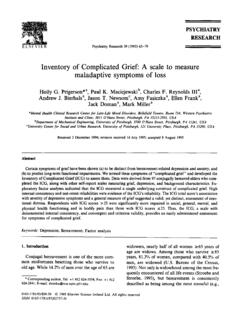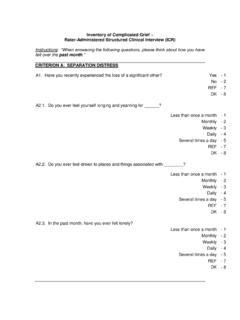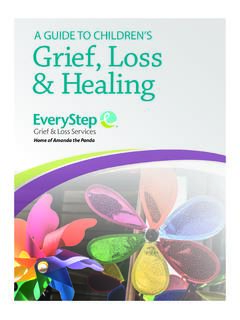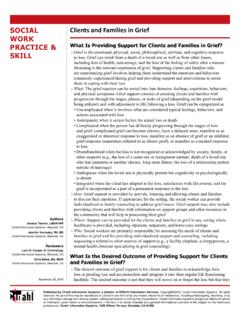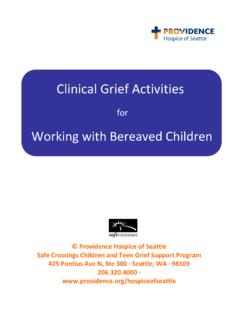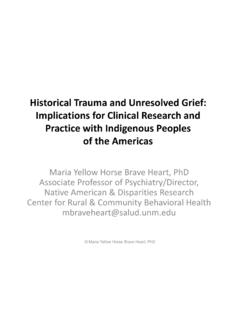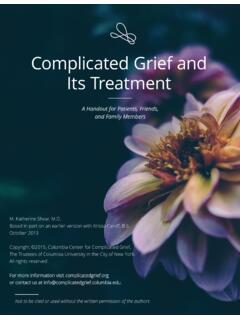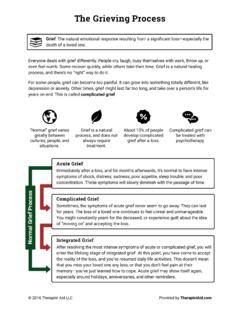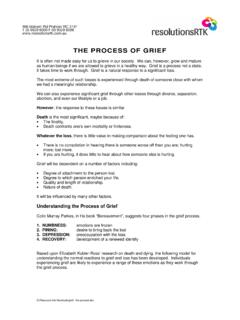Transcription of Prolonged Grief Disorder (PG 13) - Cornell University
1 S:\End Of Life Center\PG-13 self-report DFCI Psychoncmetrics 01 17 saved by Partners Information Systems Prolonged Grief Disorder ( pg 13 ) Holly G. Prigerson, , Paul K. Maciejewski, PGD is a newly defined syndrome that is a specific reaction to the loss of someone loved very much. There are a particular set of PGD symptoms feelings, thoughts, actions that must be elevated at 6 months post-loss and that must be associated with significant functional impairment in order for a person to meet criteria for PGD. INSTRUCTIONS Below lie instructions for how to score (diagnose) Prolonged Grief Disorder (PGD). Each of the requirements for Criteria A-E must be met for an individual to be diagnosed with PGD. A. Event Criterion: In order to complete the PG-13, we assume the respondent has experienced bereavement ( , the loss of a loved person).
2 B. Separation Distress: The respondent must experience PG-13 questions #1 or 2 at least daily. C. Duration Criterion: The symptoms of separation distress must be elevated at least 6 months after the loss. That is, PG-13 question #3 must be answered as Yes . D. Cognitive, Emotional, and Behavioral Symptoms: The respondent must experience 5 of the PG-13 questions #4-12 at least once a day or quite a bit . E. Impairment Criterion: The respondent must have significant impairment in social, occupational, or other important areas of functioning ( , domestic responsibilities). That is, PG-13 question #13 must be answered as Yes . PG-13 is a diagnostic tool. If a respondent meets criteria for PGD, this would suggest that he or she should seek a more thorough evaluation from a mental health professional. Only an in-person assessment by a mental health professional can determine for certain, the clinical significance of the reported symptoms, and provide recommendations or referrals for treatment.
3 Not to be reproduced without the permission of the authors S:\End Of Life Center\PG-13 self-report DFCI Psychoncmetrics 01 17 saved by Partners Information Systems PART I INSTRUCTIONS: FOR EACH ITEM, PLACE A CHECK MARK TO INDICATE YOUR ANSWER. 1. In the past month, how often have you felt yourself longing or yearning for the person you lost? _____ 1= Not at all _____ 2 = At least once _____ 3 = At least once a week _____ 4 = At least once a day _____ 5 = Several times a day 2. In the past month, how often have you had intense feelings of emotional pain, sorrow, or pangs of Grief related to the lost relationship? _____ 1= Not at all _____ 2 = At least once _____ 3 = At least once a week _____ 4 = At least once a day _____ 5 = Several times a day 3. For questions 1 or 2 above, have you experienced either of these symptoms at least daily and after 6 months have elapsed since the loss?
4 _____ No _____ Yes 4. In the past month, how often have you tried to avoid reminders that the person you lost is gone? _____ 1= Not at all _____ 2 = At least once _____ 3 = At least once a week _____ 4 = At least once a day _____ 5 = Several times a day 5. In the past month, how often have you felt stunned, shocked, or dazed by your loss? _____ 1= Not at all _____ 2 = At least once _____ 3 = At least once a week _____ 4 = At least once a day _____ 5 = Several times a day S:\End Of Life Center\PG-13 self-report DFCI Psychoncmetrics 01 17 saved by Partners Information Systems PART II INSTRUCTIONS: FOR EACH ITEM, PLEASE INDICATE HOW YOU CURRENTLY FEEL. CIRCLE THE NUMBER TO THE RIGHT TO INDICATE YOUR ANSWER. Not at all Slightly Somewhat Quite a bit Overwhelmingly 6. Do you feel confused about your role in life or feel like you don t know who you are ( , feeling that a part of yourself has died)?
5 1 2 3 4 5 7. Have you had trouble accepting the loss? 1 2 3 4 5 8. Has it been hard for you to trust others since your loss? 1 2 3 4 5 9. Do you feel bitter over your loss? 1 2 3 4 5 10. Do you feel that moving on ( , making new friends, pursuing new interests) would be difficult for you now? 1 2 3 4 5 11. Do you feel emotionally numb since your loss? 1 2 3 4 5 12. Do you feel that life is unfulfilling, empty, or meaningless since your loss? 1 2 3 4 5 PART III INSTRUCTIONS: FOR EACH ITEM, PLACE A CHECK MARK TO INDICATE YOUR ANSWER. 13. Have you experienced a significant reduction in social, occupational, or other important areas of functioning ( , domestic responsibilities)? _____ No _____ Yes Citations: S:\End Of Life Center\PG-13 self-report DFCI Psychoncmetrics 01 17 saved by Partners Information Systems Prigerson HG, Vanderwerker LC, Maciejewski PK.
6 A Case for the Inclusion of Prolonged Grief Disorder n in DSM-V. Pp. 165-186, Chapter 8 in Handbook of Bereavement Research and Practice: 21st Century Perspectives, Eds., Margaret Stroebe, Robert Hansson, Henk Schut & Wolfgang Stroebe, Washington, : American Psychological Association Press, 2008 Prigerson HG, Horowitz MJ, Jacobs SC, Parkes CM, Aslan M, Raphael B, Marwit SJ, Wortman CB, Goodkin K, Neimeyer RA, Bonanno G, Block S, Kissane D, Boelen P, Maercker A, Litz B, Johnson JG, First MB, Maciejewski PK. Field Trial of Consensus Criteria for Prolonged Grief Disorder Proposed for DSM-V PLoS Medicine Zhang B, El-Jawahri A, Prigerson HG. Update on bereavement research: evidence-based guidelines for the diagnosis and treatment of complicated bereavement. J Palliat Med. 2006;9:1188-203. Articles that have applied ICG-R to PGD criteria: Boelen PA, Prigerson HG.
7 The influence of symptoms of Prolonged Grief Disorder , depression, and anxiety on quality of life among bereaved adults: a prospective study. Eur Arch Psychiatry Clin Neurosci. 2007;257(8):444-52. Goldsmith B, Morrison RS, Vanderwerker LC, Prigerson HG. Elevated rates of Prolonged Grief Disorder in African Americans. Death Studies. 2008; 32; 4: 352-365 Kiely DK, Prigerson H, Mitchell SL. Health care proxy Grief symptoms before the death of nursing home residents with advanced dementia. Am J Geriatr Psychiatry. 2008;16(8):664-73. Morina N, Rudari V, Bleichhardt G, Prigerson HG. Prolonged Grief Disorder , depression, and posttraumatic stress Disorder among bereaved Kosovar civilian war survivors: A preliminary J Soc Psychiatry. 2009 Jul 10. [Epub ahead of print] Maciejewski PK, Zhang B, Block SD, Prigerson HG. An Empirical Examination of the State Theory of Grief Resolution.
8 JAMA 2007; 297: 716-723.
